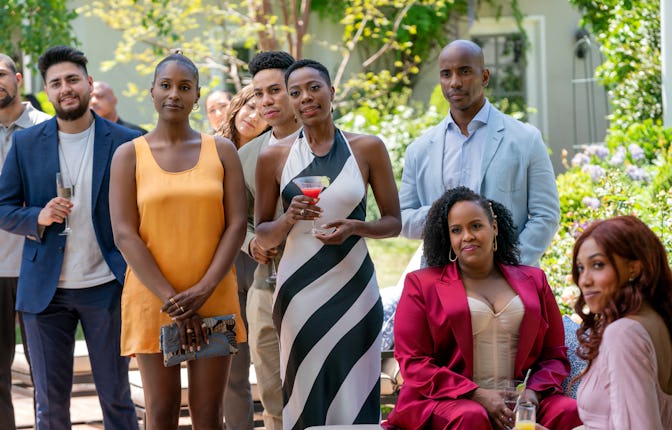The real-life stories behind some of the best scenes of Insecure
The comedy drew us in. The authenticity kept us til the end.

We argued about Team Lawrence vs Team Daniel, cursed out Issa through our TV screen, and sobbed at the friendship bond between the four central women characters of Insecure because the show felt real. It connected with us in a way that felt deeper than television — and a Vulture discussion with Insecure writer’s room shows that much of the show’s world was drawn from the real one we all have horrible dating lives in.
In the writers’ room discussion, Issa Rae explained how since the inception of the show, it was important to eschew the exaggerated nature of typical sitcom characters and “keep the show grounded” in authentic portrayals of humans. Doing so required pulling from real-life experiences make characters feel real. Issa scurrying off after seeing Molly dine at the Merkato restaurant at the end of the Season 4’s seventh episode, after the two had a falling out at Issa’s block party, actually happened to Insecure writer Laura Kittrell. In the same episode, regarding Molly’s argument with Andrew’s Asian-American brother about selective racism, Insecure’s only Asian-American writer Jason Lew wrote the scene from his own personal conversations with his Black wife about the relationship between Black and Asian communities.
Insecure became more than simply a TV show; it was a representation of an entire generation of Black people. That reverence ensures a built-in fanbase of weekly viewers but also imbues the show with a level of social responsibility the creators never anticipated. Although Rae and her writer team swore off allowing social media conversations to influence the writing of the show, when fans began criticizing the early seasons of Insecure for not showing its characters practicing safe sex with condoms, the writers found ways to include condoms in later seasons. While Rae admits she was a bit hesitant to let outside opinions alter the show, she ultimately relented due to the show’s ultimate goal of being reflections of the people who watch.
“I think the highest compliment paid to the show is that people see themselves in these characters, and if you’re watching Issa or Molly have sex and you’re like, ‘What the fuck, they’re not using a condom? I would use a condom, and I identify with Molly.’ Then it feels like we should address that.”
Throughout the show’s run, episodes were interspersed with vignettes of fake television shows like Due North, which Insecure showrunner Prentice Penny describes as “slave Scandal.” One of the funniest of the shows-within-a-show was the true-crime spoof Looking For LaToya about a young Black woman who went missing while heading into a Red Lobster. Although Looking For LaToya featured Ray J clarifying he didn’t kill her but instead “did kill the pussy” and white law enforcement agents confusing her with a missing Toyota, the inspiration behind the show came from an unsettling and underreported wave of Black girls going missing in the D.C. area around the time the Insecure writers were penning the fourth season.
“In shooting the show and the subsequent podcast, we made sure to partner with actual organizations that support the search for missing Black and brown women. We can make jokes about it all day, but it is a problem,” writer Amy Aniobi said.
Outside of Insecure’s emotional and narrative anchors Molly and Issa, no one character was more identifiable with the show than Lawrence. “Lawrence represents this Everyman in our show,” Penny shared — one who goes through trials and tribulations all men face. In Season 2 Episode 4, a chance encounter with two young women at a grocery store turns into a threesome from hell for Lawrence. According to Penny, the story arc was drawn from a friend of his who went from married life to impromptu threesomes that “went from, like, every Playboy letter you would imagine to the worst feeling ever.” Insecure was further proof life is stranger than fiction.
In the midst of all of the blowjob mishaps, friendship breakups, and misadventures in between, Insecure became the people’s champ by championing stories from real people. It gave writers around the country confidence in the dysfunction of their life becoming great TV that can unite people in shared real-life experiences.